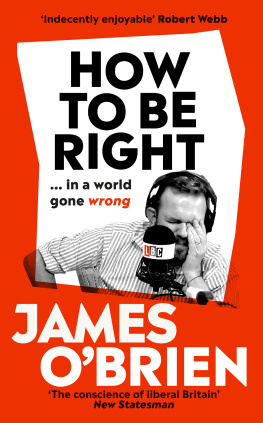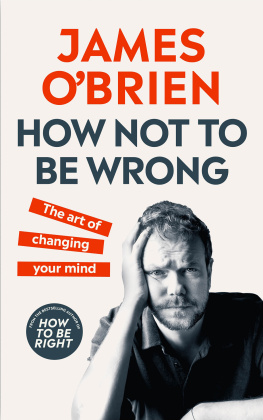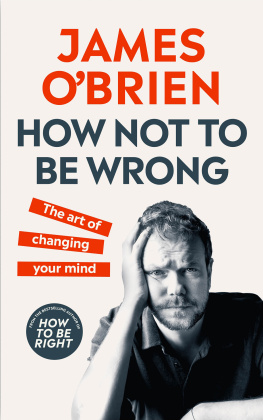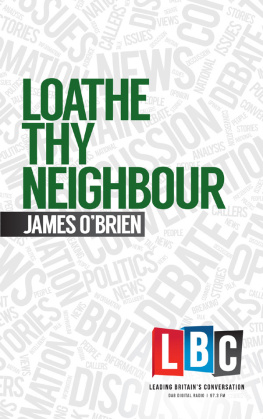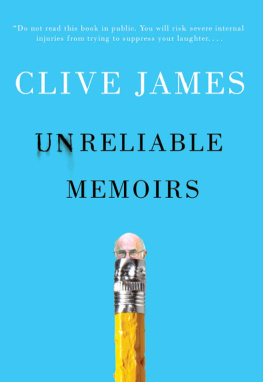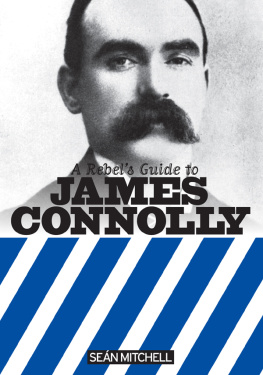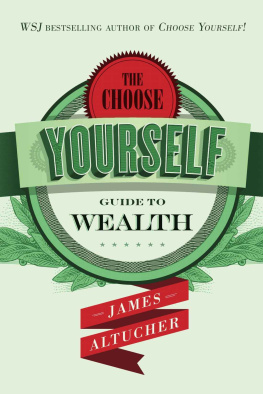CONTENTS
ABOUT THE BOOK
Forget agreeing to disagree its time to learn How To Be Right.
Every day, James OBrien listens to people blaming benefits scroungers, the EU, Muslims, feminists and immigrants. But what makes Jamess daily LBC show such essential listening and has made James a standout social media star is the careful way he punctures their assumptions and dismantles their arguments live on air, every single morning.
In How To Be Right, James provides a hilarious and invigorating guide to talking to people with faulty opinions. With chapters on every lightning-rod issue, James shows how people have been fooled into thinking the way they do, and in each case outlines the key questions to ask to reveal fallacies, inconsistencies and double standards.
If you ever get cornered by ardent Brexiteers, Daily Mail disciples or little England patriots, this book is your conversation survival guide.
I have had a ringside seat as a significant swathe of the British population was persuaded that their failures were the fault of foreigners, that unisex lavatories threatened their peace of mind and that all Muslims must somehow apologise for terror attacks by extremists. I have tried to dissuade them and sometimes succeeded The challenge is to distinguish sharply between the people who told lies and the people whose only offence was to believe them.
James OBrien
ABOUT THE AUTHOR
James OBrien is a writer and radio presenter. His articles have appeared in the Times Literary Supplement among other places, and his daily current affairs phone-in show on LBC radio has over a million weekly listeners.
For Lucy McDonald, who has taught me, among so many other things, that winning the argument doesnt necessarily mean you were right.
Above all, dont lie to yourself. The man who lies to himself and listens to his own lie comes to a point that he cannot distinguish the truth within him, or around him, and so loses all respect for himself and for others. And, having no respect, he ceases to love.
Fyodor Dostoevsky, The Brothers Karamazov
INTRODUCTION
I AM A very rare beast. I am a liberal talk show host. And as such, my job is something of a contradiction.
The true liberal is cursed with a desire, even a duty, to understand other points of view. Its a world view that admits disagreement and dissent but seeks to establish objective parameters by which the fundamental truth of things can be judged. The best way to achieve this is to ask the holders of those differing views to explain the reasoning that has led them to their conclusions. As a phone-in radio show presenter, I have probably had more opportunities to hear from ordinary people over the last few years than almost anyone else on the planet, but sadly digging deep into the foundations of a firmly held, but often evidentially flawed, opinion is rarely as simple as it sounds, nor as commonplace as it should be.
In stark contrast to the traditional liberal, the traditional radio talk show host is usually so desperate to win every argument that he and this particular breed of broadcaster is almost always a he essentially constructs an echo chamber of epic proportions and invites callers to pay homage at the altar of his ego. They are called talk shows for a reason and monologues have come to play a big part in my work but, when actually interacting with callers, less talking and more listening has, in the second half of the fourteen years Ive been doing it, yielded much more satisfying results.
For my own part, Im happy to employ a little bombast in defence of my own positions (and even happier to explain and justify them properly), but am always keenest to hear people who disagree with me about everything from immigration to feminism, obesity to Islamist extremism attempt to explain and justify their own positions. I would love to claim otherwise you need at least a slightly overdeveloped ego to do the job, after all but the fact that they rarely manage to do so is not necessarily testament to any particular talents on my part. It is a simple reflection of the fact that hardly anyone is asked to explain their opinions these days; to outline not just what they believe, but why.
Even more worryingly, the way in which furiously held convictions so often collapse under the scantest scrutiny speaks to a British society which has morphed during my years on air into a space where, for reasons we will explore, people who once felt compelled by common decency (or political correctness as they often prefer to describe it) to keep their most vile views to themselves, now feel free to shout them from the rooftops. Racism is enjoying a resurgence on both sides of the Atlantic on a scale I would have considered impossible just five years ago. The sort of language and ideas once confined to my most ignorant and bigoted callers have found their way into the White House, and the world seems split into people who find this immensely gratifying and people who find it all as puzzling as it is terrifying.
Anti-semitism, weapons-grade misogyny, white supremacism, homophobia and quite horrible attempts to frame all Muslim people as complicit in the actions of any Muslim terrorist or criminal have moved squarely into the mainstream media. I believe that this has happened precisely because divisive sloganeering and rancid rhetoric have gone unchecked. In short, people are not being challenged to justify their views, or to explain why they think what they do.
Financial crises and the ensuing hardening of the daily struggle just to get by have always left populations susceptible to the stoking of ancient hatreds, and millions of refugees fleeing wars can quickly be turned into scapegoats for public sector failings by people seeking popularity and power. The job of describing and challenging this process traditionally falls to the liberal, the truth-teller, the objective journalist, but they are a cowed breed right now, all too conscious that comforting lies deliver more clicks, viewers, listeners and profits than uncomfortable truths.
This, I think, is why so many of my own encounters with people utterly persuaded of their own righteousness but, often to their own shock and horror, completely unable to justify any of it, have enjoyed so much success online recently . It has been undeniably good for my career, but somewhat less so for my soul.
Almost everywhere, blatant lies are offered up as balance to demonstrable truths; exaggerations and embellishments are allowed in the interests of impartiality and any attempt to correct misleading statements is decried as evidence of an unspecified but deeply suspect agenda. Why should Bob in Sunderland or Julia in Richmond expect their views on, say, immigration to be challenged when every time they turn on their radios and televisions or open their newspapers they see respected establishment figures expounding similar views unchallenged, unchecked and, it often seems, unceasingly?
So lets begin with immigration.
Contrary to what many people claim, you can talk about it in this country without being called a racist. I should know, Ive been doing it for over a decade and nobodys ever called me one with a straight face. Indeed, its hard to imagine quite how the phone-in radio format would survive without the regular deliveries of conversational red meat that immigration issues routinely provide. While being told regularly that it is a taboo topic, there have been times over recent years when its felt like we talk of little else.

